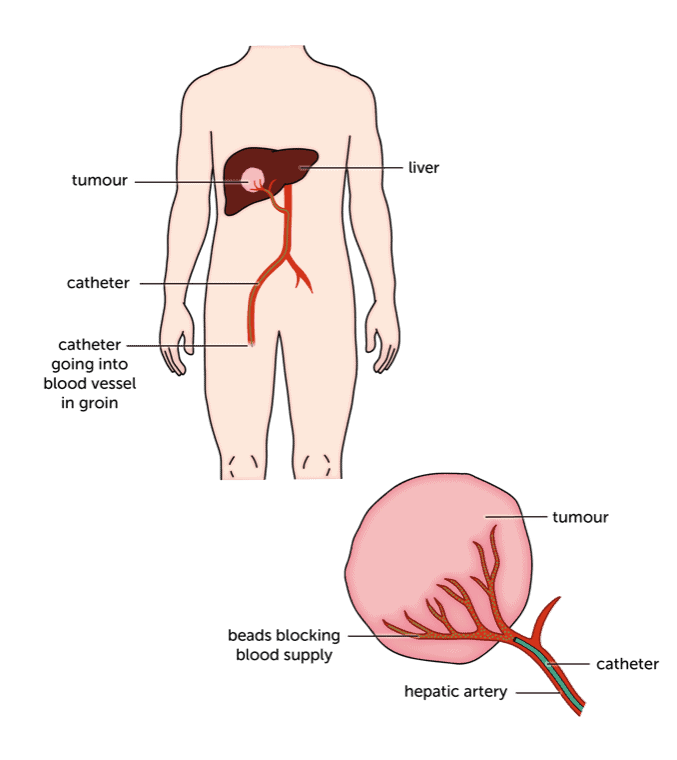Intermediate stage HCC means your Barcelona stage is B. That means you have multiple tumours in your liver, but you are well overall. Your liver is working normally or there is only moderate liver damage.
If you have 5 tumours that are all smaller than 3cm across, your specialist may suggest a liver transplant. If this isn’t possible, you are most likely to have treatment with
- TACE – blocking the cancer’s blood supply (embolization) with chemo
- SIRT or TARE embolization with radiation
The aim of these treatments are to control the growth of the cancer. Unfortunately, with this stage of HCC, they are unlikely to get rid of it completely. But your doctor may be able to use them to ‘downstage’ your cancer.
Downstaging
This means using treatment to get rid of enough of the cancer to reduce the stage to Barcelona stage A. Then, if you are otherwise well enough, you may be able to have a liver transplant to try and cure your cancer, or control it for longer.
To decide whether this is the right treatment plan for you, your doctor will look at the number and size of liver tumours you have, the results of your blood tests and how well your cancer responds to treatment. There is more about liver transplant on the main British Liver Trust website.
If you have other health problems that mean you wouldn’t be able to have major surgery, downstaging won’t be suitable for you. But you are still likely to benefit from TACE treatments.
TACE
This stands for Trans Arterial Chemo Embolisation. It combines chemotherapy with treatment to block the blood supply to the tumour. The doctor injects the chemotherapy directly into the blood supply to the liver. The chemo is mixed with a fatty oil that keeps it in the tumour. Then you have small beads injected to block off the blood supply to the cancer. Sometimes doctors use beads that are already loaded with the chemotherapy, to give the treatment in one step.

Because the chemo goes straight to the liver, TACE doesn’t have the side effects that you may associate with chemo.
There is more about TACE in the general liver cancer treatment section.
SIRT or TARE
These are the same thing. It is also treatment using embolization, but this time with radiotherapy. SIRT stands for Selective Internal Radiation Therapy. TARE stands for Trans Arterial Radio Embolization.
The treatment uses beads (called microspheres) that are loaded with a radioactive element called Yttrium 90. The doctor injects these into the blood vessel that supplies a tumour. As with TACE, this treats the cancer (this time with radiation) and blocks off the cancer’s blood supply at the same time. The radiation only spreads a few millimetres from the beads and is gone in about 2 weeks. The used beads won’t do any harm and are left where they are.
There is more about TARE in the general liver cancer treatment section.
Content last reviewed: October 2022
Next review date: October 2025
